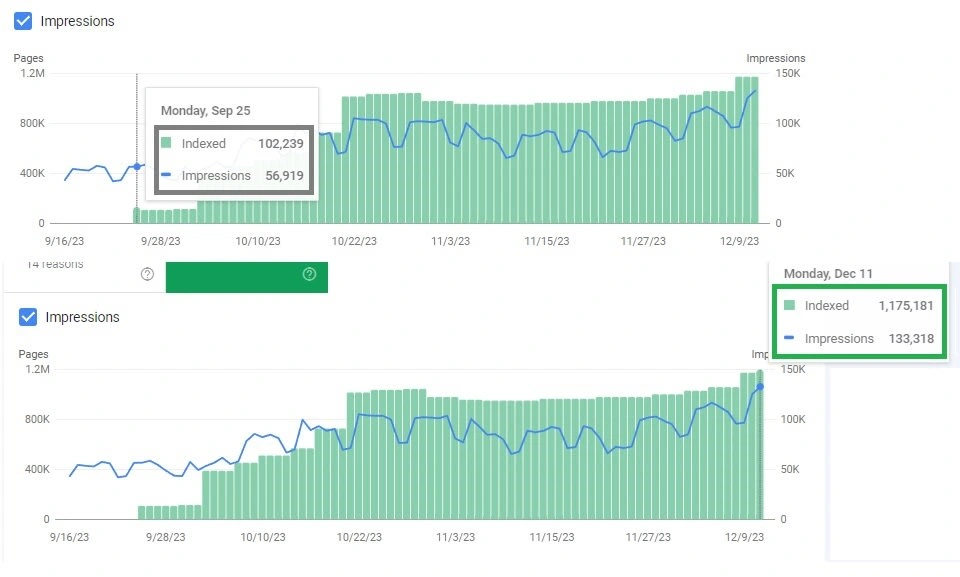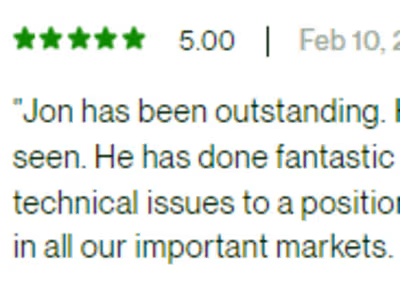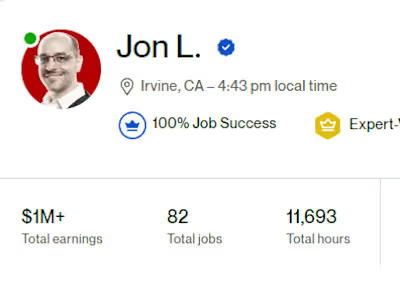Technical Remediation - Exploding Indexation from 100k to 1M+!
Below is a recent case study of Enterprise SEO results. On September 25th, 2023 daily impressions for one of my clients was 56,919 and the website had 102,239 pages indexed. Less than 3 months later, as of 12/11/2023, the site has doubled daily impressions and there was 10x growth in the number of indexed pages, surpassing 1MM.
I have experienced similar success with sites with 10’s of millions of pages, and I can help your Enterprise SEO grow at scale as well.

Indexation and impression Growth
As an expert in technical SEO, I employ a range of strategies and initiatives to expand indexation and impressions for websites. Here are some key technical SEO initiatives I typically undertake:
XML Sitemap Optimization: I ensure that XML sitemaps are correctly formatted, updated regularly, and submitted to search engines. This helps search engine crawlers discover and index new or updated content more efficiently.
Robots.txt Optimization: I review and optimize the robots.txt file to control search engine crawler access to various parts of the website. This ensures that important pages are crawled and indexed while non-essential or duplicate content is excluded.
Canonicalization: Implementing canonical tags properly helps to consolidate duplicate or similar content under a single canonical URL, preventing issues with duplicate content and ensuring search engines prioritize the correct version of a page for indexing.
Hreflang Implementation: For multilingual or multinational websites, I implement hreflang tags correctly to indicate language and regional variations of pages. This helps search engines serve the most relevant content to users based on their language and location preferences.
Pagination and Pagination Tags: For websites with paginated content (such as category pages, product listings, or blog archives), I implement pagination markup (e.g., rel="prev" and rel="next" tags) to guide search engine crawlers through series of pages and consolidate indexing signals.
Structured Data Markup: I utilize structured data markup (e.g., Schema.org) to provide search engines with additional context about the content on the website. This can enhance search engine result listings with rich snippets, which can improve click-through rates and visibility.
URL Structure Optimization: I ensure that URLs are optimized for both users and search engines, following best practices such as using descriptive keywords, keeping URLs concise, and avoiding unnecessary parameters or dynamic URL parameters.
Mobile Optimization: With the increasing importance of mobile-first indexing, I prioritize mobile optimization, ensuring that websites are responsive, load quickly on mobile devices, and provide a seamless user experience across different screen sizes.
Site Speed Optimization: I optimize website performance to improve loading times, as faster-loading pages tend to rank better in search engine results and provide a better user experience. This includes optimizing images, leveraging browser caching, minifying CSS and JavaScript files, and utilizing content delivery networks (CDNs).
Regular Technical Audits: I conduct regular technical SEO audits to identify and address issues that may hinder indexation or impact search engine rankings. This includes auditing for crawl errors, broken links, redirects, and other technical issues that could affect SEO performance.
By implementing these technical SEO initiatives effectively, I help websites expand their indexation and improve their visibility in search engine results, ultimately driving more organic traffic and impressions.
Like this project
Posted Feb 28, 2024
Recent Enterprise SEO results wherein I was able to harness technical SEO to dramatically increase page indexation from 100k to over 1M in three months time.
Likes
0
Views
21






